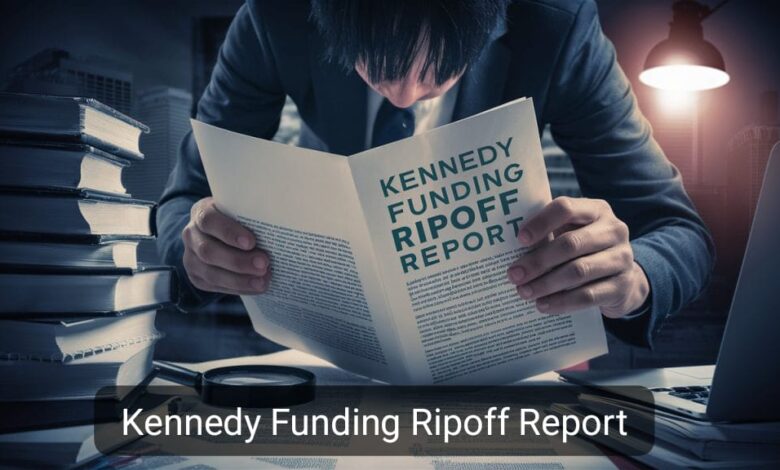Introduction to Kennedy Funding and the Ripoff Report
Kennedy Funding has made headlines recently, but not for the reasons one might expect. Instead of celebrating successes in alternative lending, the company finds itself at the center of a storm sparked by allegations detailed in a Kennedy Funding Ripoff Report. This online platform allows consumers to voice their grievances against businesses, and it seems Kennedy Funding’s reputation is feeling the heat. But what does this mean for potential borrowers and investors? Buckle up as we dive into the implications of these serious claims and uncover how they could reshape perceptions in the lending industry.
The Allegations Against Kennedy Funding
Kennedy Funding has faced serious allegations from various sources, primarily revolving around claims of unethical lending practices. Borrowers have come forward, asserting that they were misled about the terms and conditions of their loans.
Many complaints highlight a lack of transparency in fee structures. Clients allege that hidden charges significantly inflated their debt obligations. This has raised questions regarding the company’s commitment to ethical lending standards.
In addition to financial misconduct, some reports suggest unsatisfactory customer service experiences. Frustrated clients describe difficulties in reaching representatives or receiving timely responses to inquiries.
These allegations paint a troubling picture for potential borrowers considering Kennedy Funding. The impact on trust can be significant as individuals weigh the risks associated with engaging in business with them amid these claims.
Analysis of the Ripoff Report and Its Implications
The Kennedy Funding Ripoff Report has sparked significant discussion within the financial community. It raises questions about transparency and ethics in lending practices.
Many potential investors are now second-guessing their decisions. Trust is a crucial currency in this industry, and any hint of deception can lead to long-term ramifications.
Additionally, the report serves as a cautionary tale for lenders. Companies must ensure that their operations remain above board to avoid similar scrutiny. The ripple effect may push organizations to adopt more stringent compliance measures.
For consumers, awareness is vital. They should research extensively before committing funds or signing contracts with any lender mentioned in negative reports.
In essence, this analysis highlights the importance of vigilance and integrity in finance—qualities that form the backbone of successful business relationships.
Response from Kennedy Funding
Kennedy Funding has responded to the allegations detailed in the Ripoff Report with a firm stance. They assert that the claims made are unfounded and misleading. The company emphasizes its commitment to transparency and ethical practices within the financial sector.
In their public statements, Kennedy Funding highlights their track record of successful transactions. They argue that satisfied clients can attest to their reliability and integrity in lending services.
Additionally, they have expressed disappointment over what they perceive as an attack on their reputation. The leadership team is adamant about addressing these issues through open dialogue with affected parties.
They invite potential clients and investors to inquire directly for clarification on any doubts raised by the report. This proactive approach aims to restore trust while maintaining confidence among stakeholders in the financial community.
Legal Ramifications for Kennedy Funding
The Kennedy Funding Ripoff Report raises significant legal questions. Allegations of unethical practices could lead to investigations by regulatory bodies. If substantiated, these claims may result in severe penalties.
Lawsuits from disgruntled clients are a possible outcome as well. Victims might seek restitution for losses incurred due to misleading information or poor service. Such cases can strain the company’s finances and reputation.
Furthermore, a tarnished image can trigger scrutiny from lenders and investors alike. They often look for transparency and ethical behavior when forming partnerships.
In addition, ongoing litigation can distract management from core business operations. This diversion hampers growth prospects while resources are allocated toward legal defenses rather than expansion initiatives.
If the situation escalates, it could set precedents impacting industry regulations moving forward. The ripple effects may reach beyond Kennedy Funding to other entities within the lending sector.
Impact on the Lending Industry
The Kennedy Funding Ripoff Report casts a long shadow over the lending industry. Many potential borrowers may grow wary when considering private funding options after reading such allegations.
Trust is crucial in finance, and reports like this can erode confidence. If consumers become skeptical of lenders, they might hesitate to pursue necessary financing for projects or investments.
Moreover, legitimate companies could face collateral damage. They may find themselves scrutinized more closely under the assumption that all lenders operate similarly.
This atmosphere of mistrust can hinder innovation and growth within the sector. As firms tighten their lending criteria out of fear, access to capital diminishes for those who genuinely need it.
Regulatory bodies might also respond with stricter oversight as a precautionary measure against further reputational harm to the industry as a whole. This shift could lead to increased compliance costs for lenders striving to maintain credibility amidst rising concerns about unethical practices.
Conclusion: Lessons Learned from the Kennedy Funding Ripoff Report
The Kennedy Funding Ripoff Report has sparked significant dialogue surrounding the company’s practices and the broader implications for the lending industry. As allegations surface about questionable tactics, it raises essential questions regarding transparency and accountability in financial transactions.
For potential borrowers, this situation serves as a critical reminder to conduct thorough research before engaging with any lender. Understanding a company’s reputation can save time, money, and stress down the line.
Additionally, lenders must be vigilant about maintaining ethical standards. A commitment to integrity not only enhances customer trust but also safeguards their brand’s image against damaging reports that could arise online.
As discussions continue around this matter, both consumers and businesses should take these lessons to heart. The landscape of lending is continuously evolving; being informed is more important than ever in navigating it wisely.
